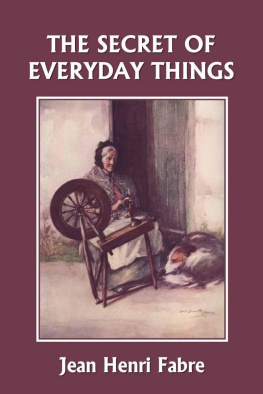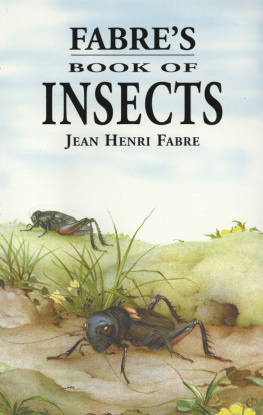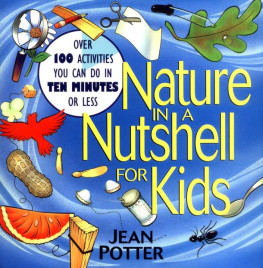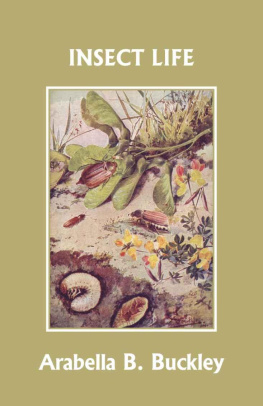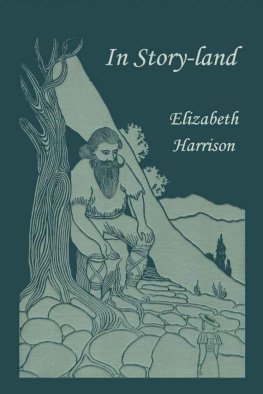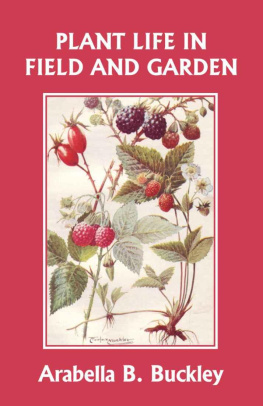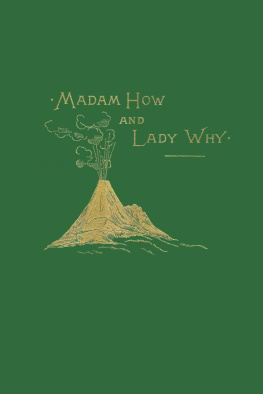The Story Book of Science
by
Jean Henri Fabre
Yesterday's Classics
Chapel Hill, North Carolina
Cover and Arrangement 2010 Yesterday's Classics, LLC
All rights reserved. No part of this book may be reproduced or retransmitted in any form or by any means without the written permission of the publisher.
This edition, first published in 2010 by Yesterday's Classics, an imprint of Yesterday's Classics, LLC, is an unabridged republication of the work originally published by The Century Company in 1917. This title is available in a print edition (ISBN 978-1-59915-025-3).
Yesterday's Classics, LLC
PO Box 3418
Chapel Hill, NC 27515
Yesterday's Classics
Yesterday's Classics republishes classic books for children from the golden age of children's literature, the era from 1880 to 1920. Many of our titles are offered in high-quality paperback editions, with text cast in modern easy-to-read type for today's readers. The illustrations from the original volumes are included except in those few cases where the quality of the original images is too low to make their reproduction feasible. Unless specified otherwise, color illustrations in the original volumes are rendered in black and white in our print editions.
Translator's Preface
Of the increasing success and widening popularity of the elementary science series written chiefly in the seclusion of Srignan by the gifted French naturalist who was destined to give that obscure hamlet a distinction hardly inferior to the renown enjoyed by Maillane since the days of Mistral, it is unnecessary at this late date to say more than a word in passing. The extraordinary vividness and animation of his style amply justified his early belief in the possibility of making the truths of science more fascinating to young readers, and to all readers, than the fabrications of fiction. As Dr. Legros has said in his biography
of Fabre, "He was indeed convinced that even in early childhood it was possible for both boys and girls to learn and to love many subjects which had hitherto never been proposed; and in particular that Natural History which to him was a book in which all the world might read, but that university methods had reduced to a tedious and useless study in which the letter 'killed the life.' "
The young in heart and the pure in heart of whatever age will find themselves drawn to this incomparable story-teller, this reverent revealer of the awe-inspiring secrets of nature, this "Homer of the insects." The identity of the "Uncle Paul," who in this book and others of the series plays the story-teller's part, is not hard to guess; and the young people who gather about him to listen to his true stories from wood and field, from brook and hilltop, from distant ocean and adjacent millpond, are, without doubt, the author's own children, in whose companionship he delighted and whose education he conducted with wise solicitude.
In his unselfish eagerness to see the truths of natural science brought within the comprehension and the enjoyment of all, Fabre would have been the first to wish for a wide circulation for his own books in many countries and many languages; and thus, though it is now too late to obtain his authorization of these translations, one cannot regard it as a wrong to his memory to do what may lie in one's power to spread the knowledge he has so wisely and wittily, with such insight and ingenuity, imparted to those of his own country and tongue.
It remains to add that in the following pages the somewhat stiff dialogue form of the original has given place to the more attractive and flexible narrative style, with as little violence as possible to the author's text.
Contents
CHAPTER I
The Six
O NE evening, at twilight, they were assembled in a group, all six of them. Uncle Paul was reading in a large book. He always reads to rest himself from his labors, finding that after work nothing refreshes so much as communion with a book that teaches us the best that others have done, said, and thought. He has in his room, well arranged on pine shelves, books of all kinds. There are large and small ones, with and without pictures, bound and unbound, and even gilt-edged ones. When he shuts himself up in his room it takes something very serious to divert him from his reading. And so they say that Uncle Paul knows any number of stories. He investigates, he observes for himself. When he walks in his garden he is seen now and then to stop before the hive, around which the bees are humming, or under the elder bush, from which the little flowers fall softly, like flakes of snow; sometimes he stoops to the ground for a better view of a little crawling insect, or a blade of grass just pushing into view. What does he see? What does he observe? Who knows? They say, however, that there comes to his beaming face a holy joy, as if he had just found himself face to face with some secret of the wonders of God. It makes us feel better when we hear stories that he tells at these moments; we feel better, and furthermore we learn a number of things that some day may be very useful to us.
Uncle Paul is an excellent, God-fearing man, obliging to every one, and, as "good as bread." The village has the greatest esteem for him, so much so that they call him Matre Paul, on account of his learning, which is at the service of all.
To help him in his field workfor I must tell you that Uncle Paul knows how to handle a plow as well as a book, and cultivates his little estate with successhe has Jacques, the old husband of old Ambroisine. Mother Ambroisine has the care of the house, Jacques looks after the animals and fields. They are better than two servants; they are two friends in whom Uncle Paul has every confidence. They saw Paul born and have been in the house a long, long time. How often has Jacques made whistles from the bark of a willow to console little Paul when he was unhappy! How many times Ambroisine, to encourage him to go to school without crying, has put a hard-boiled new-laid egg in his lunch basket! So Paul has a great veneration for his father's two old servants. His house is their house. You should see, too, how Jacques and Mother Ambroisine love their master! For him, if it were necessary, they would let themselves be quartered.
Uncle Paul has no family, he is alone; yet he is never happier than when with children, children who chatter, who ask this, that, and the other, with the adorable ingenuousness of an awakening mind. He has prevailed upon his brother to let his children spend a part of the year with their uncle. There are three: Emile, Jules, and Claire.
Claire is the oldest. When the first cherries come she will be twelve years old. Little Claire is industrious, obedient, gentle, a little timid, but not in the least vain. She knits stockings, hems handkerchiefs, studies her lessons, without thinking of what dress she shall wear Sunday. When her uncle, or Mother Ambroisine, who is almost a mother to her, tells her to do a certain thing, she does it at once, even with pleasure, happy in being able to render some little service. It is a very good quality.
Jules is two years younger. He is a rather thin little body, lively, all fire and flame. When he is preoccupied about something, he does not sleep. He has an insatiable appetite for knowledge. Everything interests and takes possession of him. An ant drawing a straw, a sparrow chirping on the roof, are sufficient to engross his attention. He then turns to his uncle with his interminable questions: Why is this? Why is that? His uncle has great faith in this curiosity, which, properly guided, may lead to good results. But there is one thing about Jules that his uncle does not like. As we must be honest, we will own that Jules has a little fault which would become a grave one if not guarded against: he has a temper. If he is opposed he cries, gets angry, makes big eyes, and spitefully throws away his cap. But it is like the boiling over of milk soup: a trifle will calm him. Uncle Paul hopes to be able to bring him round by gentle reprimands, for Jules has a good heart.


